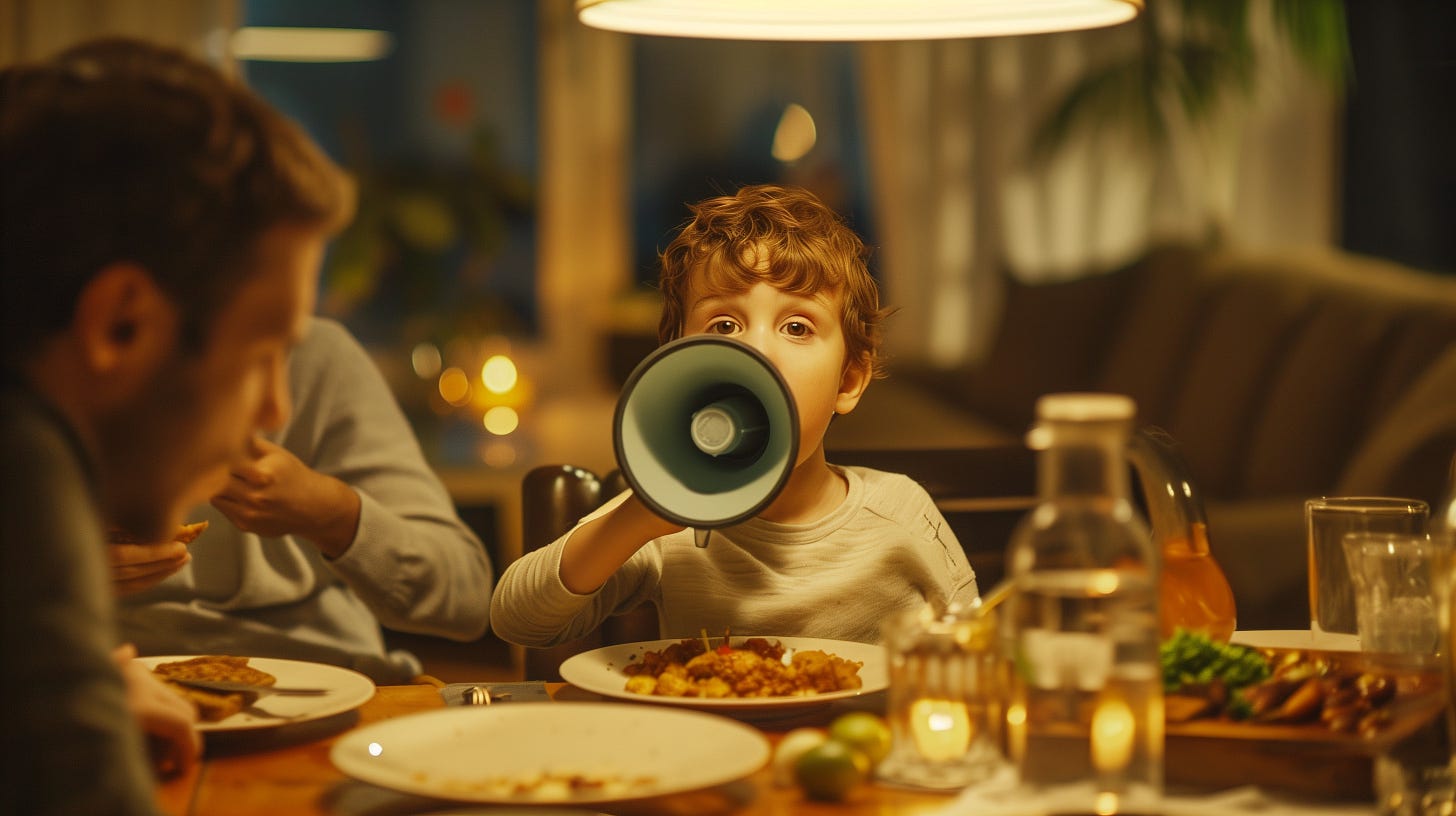When I travel with my kids over Thanksgiving to see extended family, I worry about how they’ll act when we sit down to the Big Meal. Will they have good or despicable table manners? Will they marvel or complain about the food? Will they listen thoughtfully as family members share what they’re thankful for or, instead, start throwing peas at their cousins?
As parents, we often put a lot of pressure on ourselves on family holidays. We also put a lot of pressure on our kids. We expect them to step up and behave the ways we want — the ways we think will reflect well on us. But let’s face it: They often do the opposite.
I’m here today to tell you that it’s okay if your kids act like demons this Thanksgiving. It doesn’t mean you’re a bad parent or that you have bad kids. Children are often on their worst behavior over the holidays, for many legitimate reasons.
For one thing, kids often don’t really understand what’s expected of them — and often wouldn’t be able to meet those expectations even if they did. We want them to sit still and be respectful when Grandpa takes 12 minutes to say grace, but they may not know we want that — or really understand what’s happening. We want them to try and love Aunt Chloe’s cranberry sauce, but we forget that young kids, regardless of culture, are often naturally distrustful of new foods. We want them to sit motionless and quiet for 30 minutes after they finish eating, even though small children rarely have the gross motor skills to accomplish that. We implore them to wear dresses and tights so they look nice, forgetting that they may have sensory differences that make these fabrics and fits intolerable.
Kids are typically pulled out of their routines around the holidays, too, which makes things worse. To children, routines signal safety, and novelty can signal the opposite. On top of that, if they have to travel or spend time with extended family they don’t know very well, they may feel excited, yes, but also anxious and apprehensive, which can spark clinginess and meltdowns. (They may also sense and respond to our anxiety and apprehension, which we often feel around extended family.) Instead of stepping up, our children act out — and then we interpret those “failures” as our own. We conclude that we have raised thankless brats, when really, we have raised totally normal and healthy tiny humans.
It doesn’t help that older relatives sometimes say Well when I was his age, I sat still through hour-long Thanksgiving dinners just fine. Yes, okay, maybe you did, Grandpa! But keep in mind that under an authoritarian parenting style — the parenting style that many of our parents and aunts and uncles experienced when they grew up — kids were sometimes afraid of their parents, and this was not necessarily a good thing. Kids today may well be less “well-behaved,” but they may, as a result, also be more well-adjusted. (I wrote about this once in a piece for The New York Times that went viral and, yes, made some Boomers angry. Here’s a gift link.)
I may have written a book called How to Raise Kids Who Aren’t Assholes, but I firmly believe, based on the research, that all kids act like assholes sometimes — and that’s okay. It’s to be expected. Children have very little impulse control and poorly developed emotional regulation skills. They haven’t yet learned many of our culture’s complicated etiquette rules. Of course they’re going to break the weird social rules of Thanksgiving. And they’re almost certainly not going to act as if they are thankful.
I hope you all will try to let go of guilt and shame this week if your kids don’t behave the way you’d hoped. Here are my top three tips for getting through Thanksgiving week without losing your mind.
Be clear in advance with your kids about any special expectations you have — and consider letting go of those that might be out of their reach. If you want your kids to dress up for Thanksgiving dinner, tell them that well in advance, not two hours before the meal. But also…. how dressy do they really need to be?
Let your kids eat (or not eat) whatever they want. There’s no need to spend Thanksgiving dinner arguing with your kids over how many bites of stuffing are required. This will likely ruin your meal as well as theirs. If they eat 12 popovers and nothing else, that is totally, absolutely fine.
Try to ignore other people’s looks and comments — and don’t make your life harder by trying to potentially head them off. Maaaaybe Aunt Frida will be less likely to frown at your daughter if her hair doesn’t look like a rat’s nest, but also, maybe not. We can’t control what people think or say about our kids or our parenting, and we shouldn’t waste our precious energy trying to.
How do you survive Thanksgiving with your kids? Share in the comments!








We’re lucky that my in-law’s family is too big for formal dinners and my side is small enough that dinner is just an extra two people at the table. So we don’t have any “sit there and eat” expectations but his neurodivergence comes out in a strong need to explore new environments. So when we go to my in-law’s he has a need to go into EVERY ROOM and if not watched will root through EVERY DRAWER (something that was cute at 2, but is less cute at 6). If it was just us we’d give him his headphones and tablet which would turn him into a perfect angel but since he’s the only cousin under 10 there’s NO WAY the aunts would stop trying to interact with him and while the child is a handful without electronics he is a MONSTER if thwarted from his electronics. So chasing the muppet around is what we’ve got.
I always think of the Little House books, especially Farmer Boy, when I hear grousing (shaming) about how kids don’t know how to behave at the table, or anywhere, anymore. Authoritarian to the core! Beatings to the child who reaches for a roll before his turn, which is last! But the sledding is awesome so… it’s all worth it?? Those books were a persistently if quietly bothersome inheritance for me, having read them so, so young.
Our kid is 13, past the days of meltdowns and wild anxious happiness to see Grampy and unfiltered disgust at turkey meat. When they were little, though, group meals were always a lot, and eventually we just stopped apologizing or feeling any way except “this is where our kid is at and having screen time in the living room is the call we make for them, it won’t be forever, this stuff takes time, we’ll get there, we’re just going to relax and enjoy this meal although discomfort and exhaustion vein all group meals so relax haha the salad’s really good.” You know, simple feelings! (As she falls to the floor, cackling at the slowly spinning, dust-encrusted blades of the ceiling fan.)